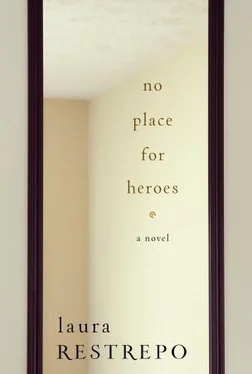Laura Restrepo
No Place for Heroes
Everyone has the right to
think his father is a good guy.
FÉLIX ROMEO
As for me, right now I’m
not in the mood to listen
to heroics.
ELIAS KHOURY

“I NEED TO know how it happened,” Mateo tells his mother. “The dark episode, I need to know exactly how it happened.”
“I’ve already told you a thousand times,” she responds.
He was the one who had given it that name, the dark episode , partly because it had been so painful but also because it was buried under a mountain of half-truths. The worst part was that he had no memory of it because he had been too young to remember. Blindly stabbing — an expression he had heard. That’s how he felt, like a blind man trying to jab his way out of a story that he did not understand, but in which he played a part and which snared him in its net.
“Come on, Lolé,” Mateo says, softening his voice and addressing her by the name he had always used when he was a child. Now he prefers to call her by her given name,
Lorenza, and when he is irate with her, simply Mother. “Come on, Lolé, tell me again. Let’s begin with the park.”
“You were two and a half. It was a Thursday afternoon, and you, your father, and I were in Bogotá. At the Parque de la Independencia.”
“And he was wearing a thick wool sweater.”
“Perhaps.”
“From the pictures I know that he liked to wear thick wool sweaters.”
“Not sweaters, pullovers.”
“What are pullovers?”
“Sweaters, but that’s what he called them. Pullovers. We Colombians call them sweaters; in Argentina they call them pullovers. Ridiculous really, since they are both English words.”
“But what I want to know is if he was wearing a thick wool sweater that specific afternoon.”
“Who knows? But I do remember his hair was long. In Argentina he always had to keep it short, the dictatorship did not tolerate hippies. But when he got to Colombia, he let it grow. If you want to know what your father looked like then, Mateo, look in the mirror and add a dozen years. That’s how he looked.”
“Not true, I don’t have wide shoulders. Uncle Patrick told me that Ramón’s shoulders were wide.”
“Soon yours will be just like his.”
“Okay, back to the afternoon, in the park.”
“Ramón and I stroll, hand in hand with you. The sky is hydrangea-blue, like it is in Bogotá when—”
“I don’t care about the color of the sky in Bogotá,” Mateo says. “I want to know what happened.”
Sometimes Lorenza tells her son that the most horrendous thing about the dark episode is that it happened exactly when she thought the horrors had all but ended. They had left the Argentinean dictatorship behind, and she and Ramón had survived living underground. After five years together in the resistance movement, they had distanced themselves from the party and left Argentina for Colombia, as bewildered as monks who abandon the cloister and poke their noses out into the world. For Lorenza, who was Colombian, the change had not been too difficult; after all, the return to Bogotá had allowed her to be with her people again, in a world that she knew well and that she took to without much drama. But for Ramón, an Argentinean, the move left him in limbo. He grew contemptuous of everything around him. He found her family abominably bourgeois and began to treat her like some unfathomable creature who had little in common with the woman he had fallen in love with in Buenos Aires. Once the complicity that had bound them during their years in the underground was broken, they became strangers to each other.
“In Bogotá, your father became invisible to me,” Lorenza confesses to her son.
“What do you mean ‘invisible’? Nobody really becomes invisible.”
“Maybe I was too busy with you, with my job, with my family, maybe just busy with myself. Besides, this does happen with people who have grown very close during times of danger. The danger passes and they quickly find out that it was the only thing keeping them together. You see, I no longer had a place for your father, like having to wear a thick coat in the middle of summer.”
“A woolen pullover in the middle of summer.”
“You don’t know what to do with such a thing, it doesn’t belong on you. But Ramón didn’t help either; he began to behave in a manner that, let’s just say, was unusual. He couldn’t come to grips with life outside the party. But wait, it was worse than that, he couldn’t come to terms with how to live outside the dictatorship, without having an enemy right in his face that he had to destroy before it destroyed him. All this made living together an incurable headache, so we separated.”
“Stop, Lorenza. We separated? You say ‘we separated’ and that’s it, you’re free and clear? Who separated? Whose idea was it?”
“Mine.”
“You wanted to separate?”
“Yes.”
“And my father didn’t want to?”
“No. He didn’t.”
“That’s very different than ‘we separated,’ no?”
“I had gotten a job as a journalist, and when I left him, I took you with me to my mother’s. Ramón stayed in the apartment that we rented in the center of the city.”
“So we suddenly became upper class, and he remained in near poverty.”
“Not exactly. You and I were in a guest room, and he had his own apartment.”
“Let’s go back to the park.”
“We’re in the park. Thursday, five in the afternoon. He lifted you up to one of the horses on the carousel, and we stood on either side to hold you and talked. A surprisingly quiet chat, I would say, nothing like the heated arguments we had before the separation. Ramón asks me if I am sure that the separation is what I want. A few days earlier he would have screamed such a thing at me, but now he poses the question in a neutral tone, like a notary clarifying some detail. I tell him yes, I’m sure, that the separation is over and done with, that it doesn’t make sense to reopen the discussion. He says he didn’t mean he wanted to discuss anything, he only needs to make sure that there’s no going back. Yes, I say, there’s no going back. He doesn’t persist and changes the topic. He says he’s going to take you on a trip to a finca for the weekend. He’ll pick you up early the next morning, Friday, and bring you back Sunday before seven at night. It’s a finca near Villa de Leyva, and your father says that I should bundle you up because it will be cold.”
“Don’t you ask whose finca it is and where it is exactly? Don’t you even ask for the phone number of where I’ll be?”
“No. I don’t want him to think that I am questioning his life. He is an excellent father, who adores you and cares for you well, and at that moment it seems to me the most natural thing in the world that he wants to spend a few days alone with you. I also remember thinking that if he was already organizing trips, it was because he had grown used to the idea of the separation. We each take you by the hand, and as night falls, the three of us stroll again through the park. At a certain point, you fall and scrape your knee and cry a little, not long though, nothing major. The strange thing is that Ramón and I chat agreeably, but about nothing in particular. For the first time since the quarrels of the separation began, we have a nice time together. I start to feel that perhaps we can function as a separated couple who share a son amicably, and that makes me happy.”
Читать дальше













